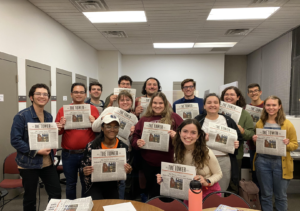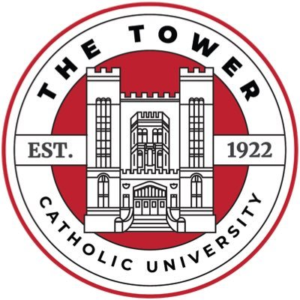Christians in Palestine: Why Are They Leaving?
Op-Ed Submitted by Adam Zeidan
Next week, the Catholic University of America will receive a Christian from Palestine to speak on the state of Christianity in Palestine. I feel it necessary, as a Palestinian-American Christian, to make other students aware that this event may not be properly representative of the Palestinian Christian community and their prospects about their future in the Holy Land.
Muslims and Christians have a long history of coexistence in Palestine. Christian heritage is ingrained in national identity, and Muslim Palestinians are proud of it. Jesus Christ—who is the messiah in Islam just as he is in Christianity— was born in Bethlehem. Santa Claus has been embraced as a national symbol of the Palestinians. The Christmas celebration in Manger Square is one of the biggest national events of the year, and the Palestinian president always attends Christmas mass.
The teaser point for this campus event is the rapid emigration of Christians from Palestine since 1920. That’s the decade when the Israeli-Palestinian conflict began—1300 years after Muslims and Christians began living side-by-side in Palestine. But the decline of Christianity clearly coincides with the Israeli-Palestinian conflict, not with Islamic culture and rule. In its birth city of Jerusalem, the Christian population declined from more than 25,000 in 1966 to less than 13,000 in 1968. What happened in 1967 that cut the Christian population in half? That year, Israel captured East Jerusalem in the Six-Day War and took control of the city. Israel’s policies to maintain its claim on the Palestinian-majority city, especially since 1994, have ravaged the traditional economies of the nearby Christian cities of Bethlehem and Ramallah, disproportionately affecting Christians in the West Bank.
The fate of Christianity in Palestine is thus tied intimately with the fate of the Palestinians as a whole, including our Muslim brothers and sisters, and I worry that the upcoming event at CUA will not properly reflect that fact.
The organization behind the event, The Philos Project, purports to promote understanding of the Middle East and advocate a pluralistic Middle Eastern society. At the same time, it insists on the superiority of Western values and alludes to ideas of a clash of civilizations between the West and Islam. It singles out a “sectarian battle over Islam” as one of the key issues facing the Middle East today. Yet despite its insistence on engaging dynamically with the Middle East to promote understanding, there is a notable absence in the organization actually engaging with the Islamic world at all. On the other hand, the organization does appear to have numerous programs for promoting Jewish-Christian relations and initiatives to bring young Christians on visits to Israel. Is the organization really focused on making room for a pluralistic society in the Middle East when it has almost no positive engagement with the Islamic world? Or is it more interested in promoting the image of Israel while portraying the Islamic world as intolerant and problematic?
I admire the speaker for his courage and effort to build bridges between Israelis and Palestinians. Humanizing the other is what Israelis and Palestinians need most right now, and he has taken initiative to promote just that. I too have worked actively to promote a culture of coexistence, including having worked for an Israeli NGO in that pursuit. I also came to pursue a doctorate at CUA in part from my interest in supporting Christian minorities of the Middle East.
Without meaning to demean the speaker’s very personal experience, however, I have to point out that there are some red flags that make him sound out-of-the-ordinary from most Palestinian Christians (who are almost all Catholic and Greek Orthodox). Among the oddest is his claim that he was born and raised Greek Orthodox, but that he did not become a follower of Jesus Christ until he was 17. Such language suggests an embrace of an evangelical interpretation of Christianity that not only sees Catholicism as antithetical to the teachings of Christ, but also teaches what is called “Christian Zionism”—a 20th century evangelical idea that the State of Israel is a fulfillment of God’s will. Indeed, other key members of the organization openly advocate Christian Zionism, while none seem concerned with building Christian-Muslim relations.
While I believe firmly that it is of utmost importance that Palestinians and Israelis accept one another as permanent neighbors with unconditional love, Christianity will only survive in the Holy Land if pressure is placed on Israel to make space in its society for Palestinian Christians. While Palestinians appreciate Christianity as part of their heritage, churches and Christian cemeteries in Israel regularly face vulgar desecration and clergy face harassment. Last year, the Israeli municipality of Jerusalem tried to tax churches in the city a tyrannical $186 million; it was international pressure that put an end to that crisis. While Palestinian laws promote Christian heritage and Christian representation in government, Christian representation in Israel’s government is almost entirely nonexistent and a recent Israeli law declares that the Jewish people have an exclusive right to self-determination in Israel. A few weeks ago, Israeli Prime Minister Netanyahu publicly stated that Israel is “a state for Jews alone” and “not of all its citizens”—roughly 25% of Israeli citizens are not Jewish. If you care about what Christians in Palestine themselves have to say about the threat to their community’s future, I urge you to check out their own initiative to have their voice heard abroad: Kairos Palestine (www.kairospalestine.ps). Among the initiative’s signatories was the Latin Patriarch of Jerusalem, Fouad Twal (2008–16). Kairos was not only put together by a broad group of Christians in Palestine, but it represents virtually every Christian community native to Palestine.







